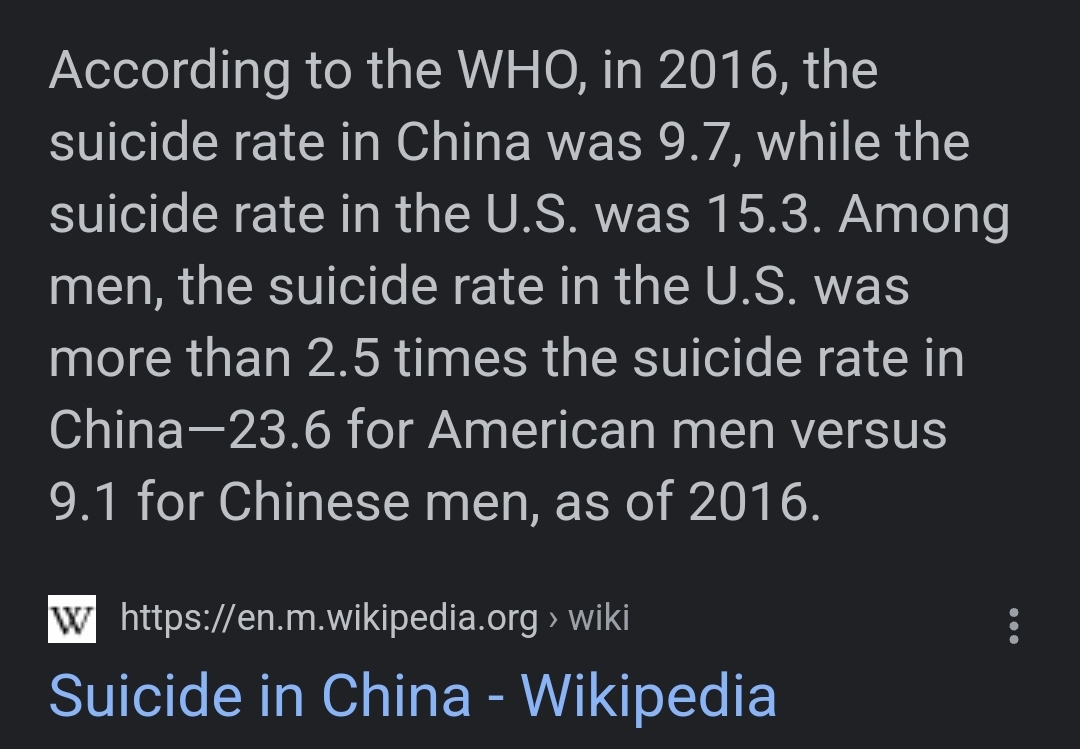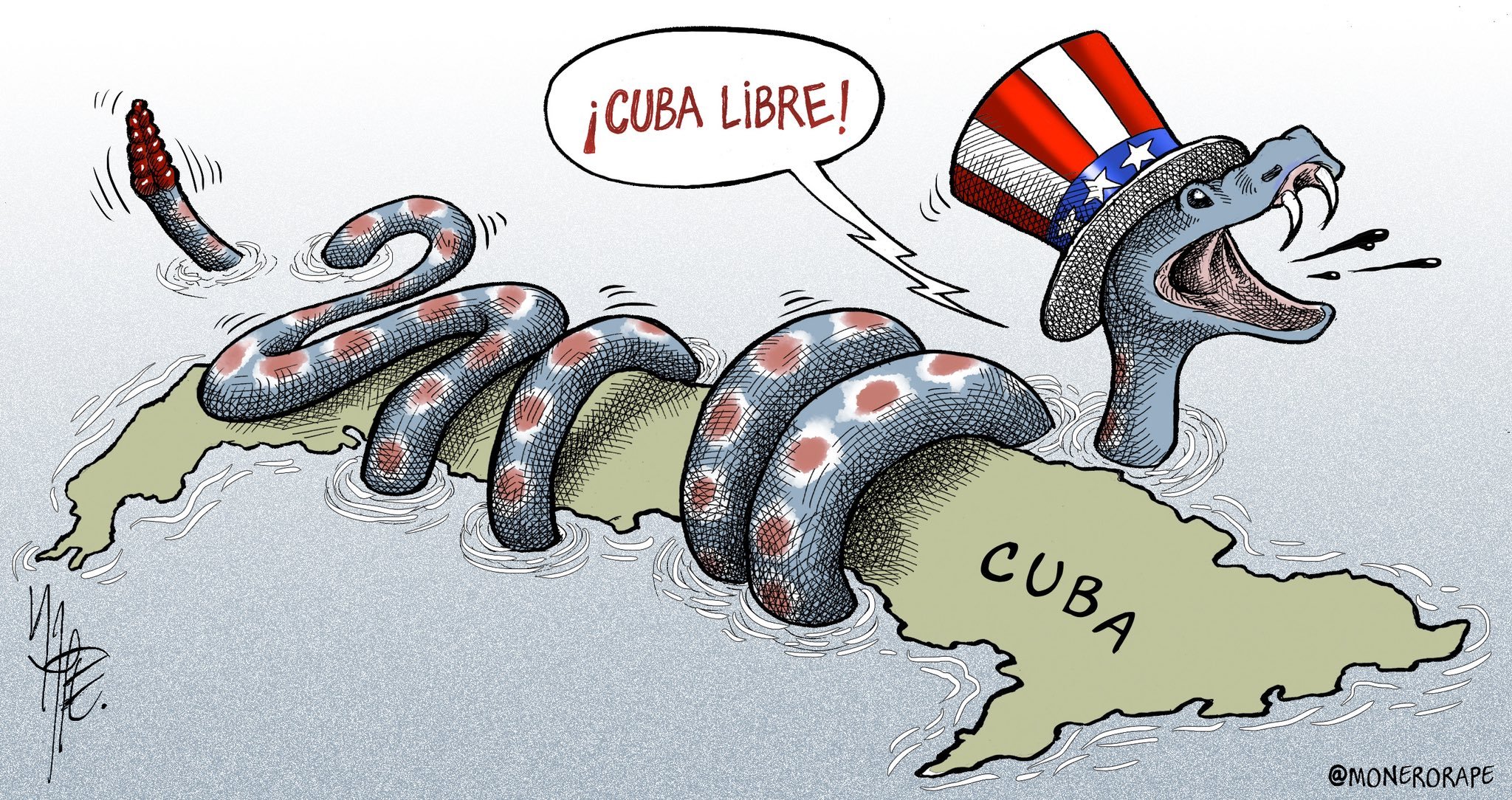Full disclosure: I’m training to be a psychologist (not psychiatrist)
I’ve been browsing here a lot since Genzedong got quarantined, as I had been expecting a full removal soon after. The general community here is so positive and funny, I found myself preferring it to the subreddit.
I decided to break from my lurking ways to comment on an unfortunate trend I’ve noticed: A few, maybe just one or two, users trying to bring legitimacy to anti-psychiatry rhetoric. These users are getting a great deal of attention for their posts, and they seem to me to be legit comrades, regularly posting in other subs as well. I think these users are genuine, and I don’t intend to make this about them, nor am I about to speculate about their personal reasons for perpetuating these messages. I will say only this about them: There is a worrying tendency to fully dismiss the experiences and views of mental health professionals, saying that speaking to us is “like speaking to a wall,” and encouraging other users to simply ignore our responses. I think I only need to describe this sort of behavior for the troublesome qualities of it to become self-evident. No more needs to be said on it.
Now, I want to speak first to the kernel of truth in the anti-psychiatry lie, because this is somewhat personal to me.
Following the death of my 24 year old brother in 2020, I had a very hard time maintaining my professional life for a little over a year. He was not only my closest friend, but also the only person with whom I could share my political thoughts openly, expecting that he might be feeling similar. Simply put, he was the only socialist I knew.
At my field placement at the time, I was often working with people who were hospitalized. The fact that capitalism contributes to mental illness was not a new concept to me, but seeing how many of our patients were homeless, and knowing that, sometimes, they were sent back to the streets after we had gotten them “back to baseline,” was devastating for me. It was the sort of disruption that makes a person question the field they are in.
Cut-to October, 2021, I’m the only student in a classroom, explaining to 6 professors why my performance is slipping lately, and I find myself explaining that I feel impotent as a therapist, eventually yelling something rash to the effect of “If we actually wanted a psychologically-minded approach to helping these people, we’d be giving them houses!” Further, I was boiling in anger so slowly I almost didn’t notice it, because I had no one - zero people - in this liberal-as-hell program to discuss my beliefs with. No one outside of it. Just no one. I was surrounded by people who loved to talk about “systems,” but couldn’t form a coherent thought about the economic system that undergirds all of the ills of these other systems.
It is true that therapy and psychiatry are often bandaids for people living in a sick society. It is true that many of the problems we seek to address are exacerbated or outright caused by living in a capitalist system. It is true that therapy addresses the suffering of individuals, when that suffering is often the result of communal discord.
It’s deeply unhealthy to get stuck there though. I was for a time, and my outpatient clients likely suffered lower quality treatment from me during this time. I know everyone around me suffered a lower quality me.
We are historical materialists. Because of the suffering caused by capitalism, it can be easy to lose sight of the materialist understanding of capitalism as an inevitable and necessary next step beyond feudalism, leading to socialism. Capitalism is not an entity you can diagnose as evil and then determine that everything birthed from within it is therefore also evil. That’s idealism. The fact that psychiatry and therapy inherited flaws from operating within a capitalist system says absolutely nothing about their inherent nature, the intent of them, nor their impact.
Now let’s get more specific. This entire dance of tying capitalism and psychiatry together utterly ignores basic realities - like the fact that some mental illnesses seem to be primarily organic, that is, relating to the person’s biological make-up, their “wiring.” Primary examples of this include ADHD, Bipolar and Schizophrenia. If you suppose a person with schizophrenia or bipolar would suddenly be highly functional, absent medication, in a world where we’ve reached international communism, you are simply making a massive, uneducated guess. We don’t know that, and anyone who has spent considerable time among the severely mentally ill population will tell you that it seems extremely unlikely. Further, we haven’t reached communism, so it seems reasonable to suggest we do what we can for people who are suffering currently.
A lot of anti-psychiatry rhetoric seems to come from the neurodivergent crowd, specifically people with ADHD and/or autism, who have felt mistreated by the field of psychiatry because they aren’t disordered, just different from the type of person who succeeds under capitalism. There is a lot of truth to this, and I wish I had better answers for these individuals. Perhaps under communism, people with ADHD and Autism will feel no need for therapy. Then again, perhaps they’ll still suffer from higher rates of depression than other people, simply because they find it harder to fit in socially. A lot of unhelpful speculation is required to even have that conversation. I’m more interested in helping people with the problems they say they want help with in their lives, at this point in time.
Now to get on to what most people think of when they think of psychiatry and therapy. When I’m helping someone with OCD learn to work past their compulsions effectively enough that they can finally do something enjoyable with their time, no one gives a flying fuck if capitalism has to do with why they can’t stop checking, and re-checking that everything in their home is “just right.” When I’m helping a socially anxious person find human connection, or a depressed person find something rewarding to engage in, again, the discussion of how their mental illness is a result of capitalism feels trivial in the face of their suffering. Yes, every single one of my clients deserves revolution. No, I’m not capable of bringing about that revolution on my own, but I can help my clients make friends and find meaning in the lives they do have under this capitalist system.
The last problem with anti-psychiatry being tied to Marxism is more pragmatic: People who are curious about communism come to this site. Most people’s (with very unfortunate but real exceptions) experience of psychiatry and therapy will not map onto the exploitative machine described by the anti-psychiatry folks any more than their experience of the medical field does. This means that any curious liberal who comes into this space looking for answers is going to be immediately turned off.
Anyway, I’m really thankful for this place and hope this post doesn’t make me a pariah around here in the future. Thanks for reading, comrades.
Edit: A previous version of this post contained language that was unfair to the anti-psychiatry crowd. This was a mistake pointed out to me in the comments, and I see what they mean. I’ll do better with that in the future.
Do you remember when ADHD was never heard of, then suddenly became a behavioral pattern? Suddenly news came along with the “epidemic of ADHD”, with more and more cases each day.
I don’t claim that ADHD is not a particular set of behavioral patterns. But I think what @panic@lemmygrad.ml and others here are pointing to is that perhaps ADHD has something to do with the fact that we spend more time in computers and electronic devices instead of spending time with people? That our low attention span has something to do with the machine learning algorithms behind the content pushed on our social media “feed”?
We should be looking at the historical material reasons behind these behaviors because human behavior is mostly social, and changes constantly over time. The mistakes of the “psychiatry” folks is that they completely individualize all behavior, and ignore the social causes behind these issues. You could say this is a liberal deviation of medicine and science, but liberal wouldn’t be even too far fetched, considering how much the multibillionaire pharmaceutical profits through this ideology.
Psychiatry has some valid discoveries and scientific research. Such is the case of schizophrenia, anxiety disorders and sleep-inducing chemicals. But psychiatry is dominated by bourgeois interest from its core to its form. Anyone who claims otherwise have never read the DSM-V and its history. Homosexuality was considered a genetic disease until the 70’s, and until 2015 being a transgender was considered a mental disorder as well. What was the criteria used to consider these gender expressions as disease, and how come “suddenly” they are not again?
Read about histrionic personality disorder. You can clearly see whoever conceived this as a “disease”, was almost certainly a male chauvinist. It’s basically a continuation of the “female hysteria” lineage. It considers being seductive, dramatic and attention-seeking as behaviors associated with this “disorder.” And the criteria used to determine if one is an exponent of this disease is simply the subjective experiences of the doctor. This is simply a disease which the American Psychiatric Association, which is a bunch of white men discussing about queer people and women as having a disease because they do not fit into their conceived standards of human behavior.
There is no intrinsic human behavior. We are all social consciousness, and you cannot understand human behavior if you ignore social life. This is a massive gap in Psychiatry’s “scientific” methodologies.
What would really help, is to find the standards and mental health practices that AES countries are using (esp Cuba, China, and Vietnam), and use them as our starting point, rather than the DSM.
I have a comrade in a legal profession who’s dealing with a similar issue: western legal frameworks (esp anglo ones based on precedence) are dogshit, but there’s a lack of familiarity with how other countries are handling the same set of problems.
Learning more about how AES countries are furthering these disciplines might be the best way.
Removed by mod
https://www.ncbi.nlm.nih.gov/pmc/articles/PMC3188776/ This is a really informative paper on the huge expansion on mental health treatment in China. Like most things, market reforms led to a relatively short decline in mental health treatment available to the poor, but recent reforms have greatly made it more accessible and comprehensive. This article is dated at 2011, though.
It seems that there is a focus more on community and family based aid for those with mental health issues in China than on more individualized care. Interesting stuff.
edit: https://www.google.com/amp/s/supchina.com/2021/11/11/mental-health-in-china-explained-by-shanghai-based-clinical-psychologist-george-hu/amp/?espv=1 This is a transcript from a podcast, Sinica, based in SupChina. SupChina considers itself “neither pro-China nor anti-China, neither pro-America or anti-America” and claims it doesn’t receive funding from any govt. The guy they interviewed here is ostensibly a psychiatrist based in Shanghai, and although there’s some cringe jokes at the beginning, there’s some wonderfully insightful stuff regarding China’s ongoing struggle in creating better mental health support and, pertinently, attempts at combating Westernization of psychology and over-prescription. @Amicchan@lemmy.ml
How did I get a notification for this comment
I pinged you 🤓
It was just a mention
Removed by mod
My main issue with the sub is that it can be a place to grow baseless anti psychiatry sentiment rather than an actual discussion sub about current day psychiatry. There should be people with knowledge on the topics giving a bit of feedback, otherwise it can quickly turn into a ‘psychiatry bad’ sub and there’s no benefit in that. This is how debates on vaccines get hijacked and turn into antivax movements.
I try to chime in with my experience in the field. Feel free to do so as well.
Removed by mod
Yes I know and that was the point of my comment. It’s good to have a discussion about current day psychiatry but there need to be rules in my opinion. Discussion is great, but if people start to encourage others to quit medication all of a sudden then lines should be drawn. It’s a very sensitive topic where people could get easily hurt if people aren’t careful enough.
I’d like to add to this that I don’t want anyone to be forced to take medicine. That’s not the point of my comment. Rather, if one feels the need to quit medicine, they should contact professionals about it before listening to people on the internet. This way you can quit in a safe way.
In my experience when people quit medicine, they get some guidance as to why they want to quit and after that they get a quitting schedule if necessary. This is to prevent shit like seizures and whatnot happening if you’ve got certain meds. You know, so you don’t die. Not because people want to force meds on you (not saying that doesn’t happen).
Removed by mod
No, they should discuss this with the people that prescribe these meds. Some meds are dangerous to quit cold turkey, both for physical and mental health. I work in mental health care and even I can’t advise people quitting. I can get banned for life in my profession for it. There are reasons that you need actual med studies to be able to prescribe them and guide people taking them
Quitting meds is not something you should just advise people if you did not study medicine. It’s dangerous. Not all psychiatrists are scumbags. In fact, most of them aren’t. This is what I mean when I say I have problems with the subs. I’m not saying you shouldn’t discuss meds but it’s not something that should be treated lightly.
If a person has problems because of meds it should be discussed with professionals.
Please realise that psychiatry is not a bad thing per se.
Removed by mod
I feel like psychiatry has not been good to you. If that’s the case, I’m sorry. No person derserves that.
I’m not taking your comments as being of bad faith. I understand where you’re coming from and I understand your concerns.
I just hope the sub can stay a place for discussion, even if that means discussion with people that are not anti-psychiatry per se.
Removed by mod
deleted by creator
You think people shouldn’t be allowed to discuss quitting PPIs, which are commonly used when not needed and causes more problems by alkalizing stomach acid?
That’s not… how PPIs work. If this is the standard you apply to pharmacological knowledge I will have laugh at your confidence having these sorts of discussions. Come on, comrade.
Edit: Okay, I was mean and that serves no purpose other than make me feel better for knowing something you don’t. I’m sorry. My point still stands but I don’t have to be a dick about it.
Removed by mod
Also you can just quit them with no risk of a life threatening serotonin syndrome which makes them different from many psychiatric meds
Removed by mod
If you ban my antipsychotics I will go insane. I experience no withdrawal effects but the symptoms I use them to treat come back. In what world is banning safe pharmaceuticals better than real protections for patients.
Something interesting to consider for people on the fence or not sure what to think. I’m sure this correlates to a lot of different moving parts and I’m not sure precisely what it proves, but it’s an angle worth pointing out.

International analysis of suicide and mental health rates without material and dialectical analysis can easily lead some “scientists” down the road of race science if done through the lens of “chemical inbalance” theory. That or misguided cultural-orientalism. “Well, the confucian ideology…” etc. We have to consider, materially, why some mental health issues are epidemics in many western nations and not elsewhere. Who claims they’re epidemics, what is the prescription for dealing with them, what is the root cause, is there under or overreporting being done, etc.
This is also a great resource I would not have discovered without comrade Amicese (who I believe is a very curious comrade who has spawned a lot of very interesting discussions and who is, from my perspective, being unfairly lambasted in the comments for asking some uncomfortable questions or making some disagreeable claims) and the anti-psychiatry sub. I believe ideologically it may be eclectic, but it’s a brilliant insight into the pseudo-class war going on behind the scenes in the psychiatric field in Amerika.
How long can you ignore the experiences of people who say therapy and medication helped them before you just permanently plug your ears?
I’m “anti-psychiatry” in the sense that I believe the way patients are treated is dehumanizing and traumatizing. If a doctor can deny me of my agency then my rejection of the discipline is only self-defense.
I don’t believe psychotropic drugs are placebos. I take medication I’m comfortable with following a doctor’s advice.
If I believed I had to wait for the revolution to solve my mental problems I would have killed myself, not become critical of the discipline.
That’s being critical of psychiatry though. This comment seems completely different from the “anti-psychiatry” that’s been popping up on this site. Being comfortable taking a doctor’s advice and being on medication puts you at odds with the anti-psychiatry that keeps popping up here.
If I told you I believe that most diagnosis of mental illness don’t have an organic basis. Are shaped by our modern understanding of psychopathology, implying that society creates many mental illnesses. That I believe we’ve barely moved past lobotomies. Would you believe I’m merely “critical”? Doesn’t sound right to me, but okay. I’m not taking part of a race about who’s more radical, tbh
But many do have an organic basis. Society can have negative impacts on the workers health and create a “biological disbalance”. The cause may be social but it creates the organic basis for the illness to exist. Therefore to really help someone psychiatry alone is not the awnser, instead, we would need a “sistemic” approach consisting of psychiatry + other things that adress their social and economic material needs for example
I’m not claiming dementia will be cured with communism (but maybe we should try) if that’s what people think from my comment
Edit: i promise you bro, just give me communism and Ill stop taking risperidone pls jusg letme hav this
Removed by mod
I’m going to give you two awnsers,one is more of a direct awnser, the other one is more general.
1 - What I mean by “Biological disbalance” is for example, if the amount of neurotransmissors such as serotonin someone produces is not enough which leads to depressive state. This can happen for many reasons including enviromental (i.e. capitalist system) ones.
2 - I read many other peoples responses, including yours, and I feel like we are mostly on the same page. Most of your criticisms are valid and I endorse them. There are many things wrong with modern day psychiatrism and we need to be critical of it. But that doesnt mean psychiatrism is a pseudoscience. Many of their claims can and have been falsified, for example, homossexuality used to be in the DSM, it no longer is. Id like to draw a parallel here with biology, and I think it will explain better what I mean. Biology is a science and has been for a long time, even during the period that they developed the “scientific rascism” “thesis”. Obviously, this “thesis” is unscientific and must be criticized, but that doesnt mean biology is a pseudoscience. So yeah we must oppose forced medication amd internemnt. We must oppose manicomials and eletroshock terapy. But psychiatrism is a science.
I’m autistic and I have psychiatric evaluation constantly. Not only that, I also have friends with depression and schizofrenia that need medication. I used to opposed medication strongly before even discovering about the whole capitalist bs. I simply never liked it. But knowing these people before and after medication for years, its clear to me it helped them. Im still not a fan of medication though.
Removed by mod
We got dementia, drug addiction and genetic developmental disorders. Wouldn’t call it “many diagnosis” but certainly not the ones people are thinking to treat with benzos. Doesn’t surprise me that people with these conditions aren’t treated much better by psychs anyway.
deleted by creator
Yeah, so after reading these responses, I will concede that I think what you’re saying is dangerous and without any sort of grounding. I would have to ask what you suggest we do with what we currently call “mental illness” at this point in time.
Poverty alleviation and real protections for psychiatric patients. I would purge every ableist professional from the field. I would make mental health workers consider what patients feel like when they enter their treatment, if they would be okay being treated in such ways as a “sane” person.
The first one would be great to see! And the next two are, in fact, practices within the field, as are regular debates about such things as hospitalization. Don’t get me wrong, it’s not done enough. But again, what you’re saying isn’t anti-psychiatry in the way I meant unless you’d actually discourage people from seeking help, or unless you think we should do away with mental health professions until capitalism is out of the picture.
If this comes off like a personal question, feel free to ignore it, but would you actually tell a hurting friend not to see a psychiatrist or therapist? I think a difference between what I’m seeing in what you’re saying, and what the anti-psych posts are saying comes down to that.
I have family who’s mentally ill. If I ever see that their treatment puts them in danger of losing their bodily autonomy I’ve promised them I will be the first one to interfere.
If I took my medicated and mentally ill family and forced them to reject medication and therapy they tell me helps them I would be harming them. The same way I won’t give up my meds and therapy all in the name of ideological purity.
I don’t discourage people from treatment, I want them square and center on all the decisions about it.
Let my opinions be tainted by my personal experience as a mentally ill person with mentally ill family.
different from the “anti-psychiatry” that’s been popping up on this site
If you look at that particular community, 90% of threads seems to be made by the same person, so it’s not even really representative.
Being comfortable taking a doctor’s advice and being on medication puts you at odds with the anti-psychiatry that keeps popping up here.
I will add that I’m currently on a safe place where my opinion on psychiatry will not get me in danger. And therefore I have the freedom to pick and choose what I want to take from the current state of psychiatry.
Other people might not, or the might still be dealing with the trauma they’ve suffered, so I don’t find it weird they might choose different from me.
Honestly don’t have a stake or much experience or anything of value to add to this discussion - my contact points with the fields discussed are minimal. Just gonna leave this: Good post, comrade, interesting discussion.
I’ll also say this entire line of reasoning “capitalism has engulfed and influenced field x negatively, therefore entire field x is to be discarded” is just strange and could be applied to almost anything. Economics, climate science, identity politics, health care, hell even socialism in and of itself. And yes, there are people that discard these fields and issues entirely due to capitalism’s appropriation and destruction of them, but I thought we generally oppose those people and their reasoning.
This is a good addition.
Maybe an analogy is the pharmaceutical industry.
Yes, in capitalism it’s motives are distorted. Yes, this means there are mistakes that might not have happened but for the profit motive (thalidomide, for example).
No, we should not dismiss every medicine developed by big pharma. This reasoning would lead us quickly to join the anti-vaxxers, and I’m quite hopeful that there aren’t many of those around here.
tbf thalidomide was safe, it was the isomer that was dangerous. That could not have been forseen. Or am I remembering the wrong chemical?
Whoa, great point in that second paragraph. It really could be said of pretty much any field.
The criticism is mostly levied at over-prescription of meds and many diagnoses being treated as hard-and-fast science when I’m sorry, but from my experience and my reading, they most certainly are not. For the record, I am diagnosed with Bipolar 2, MDD, comorbid borderline personality disorder, and GAD. I also have years of experience working with individuals with developmental and “intellectual disabilities” (the industry’s terminology, not mine). I am also heavily medicated, and I think it works for me… mostly. For now.
There is a trend recently of many, many diagnoses being treated as a sliding scale. What is considered autism can present in almost an infinite possibility of ways, yet depending on things like your area, your income, etc. the modality of care remains the same, as a dogma proscribed by national psychiatric institutions. Someone who is incapable of deemed “proper” social interaction through understanding jokes or sarcasm might be labeled as suffering from the same condition as someone with uncontrollable fits of rage and the inability to properly feed themselves. Medications prescribed as beneficial to people with autism might, and regularly are, given to both. Women are much more likely to be “(mis)diagnosed” with BPD than with autism, and black kids are rarely diagnosed at all with more of a focus on home life and parental blame.
Brain scans and MRIs have been regularly utilized (at least in the past) to diagnose bipolar disorder and borderline personality disorder. There is considered some scientific correlation between certain abnormalities on the brain and abnormalities in behavior. Yet, diagnostic criteria for many, many disorders necessitates absolutely none of these physical abnormalities, and usually rely on pseudoscientific examinations of haptics and Buzzfeed-style quizzes that rate your depression level or anxiety level with a number utilizing questions regarding suicidal ideation and feelings of restlessness.
Say your car broke down. Your partner left. You’re facing the threat of eviction. You got fired and can’t find a new job. The state is not giving you unemployment. You have a doctor’s appointment. When your “analysis” presents that you’re now a 20 (severe depression) a on the sliding scale of what clinical depression looks like, and two months ago you were a 9 (mild depression), your doctor refers you to a psychiatrist. You tell your psychiatrist you feel like a failure to your family and your loved ones. You tell your psychiatrist that your motivation is dwindling. You tell your psychiatrist you feel you’d be better off dead.
“I think we’re going to try you on a four-week trial of fluoxetine. If by the fourth week you’re not feeling any better, we’ll begin to ween you off of that and try something else.”
Are you telling me that skeptics of this line of thinking are promoting dangerous ideas for not buying the “chemical imbalance” theory? There almost certainly are individuals who were born a certain way that necessitates life-long care and medication (I have met PLENTY of them, very lovely people who would not be able to live totally independently even under a socialist or communist system), but pathologizing poverty is a sick facet of Amerikan and Western medicine that needs to be destroyed.
After telling my doctor about “real stressors” in my life, chronic joblessness and rent and interpersonal struggles, they recommended switching my SNRI to a different one that has been “shown to have more success in patients with bipolar.” This is pseudoscientific garbage. The withdrawals from my SNRI are so bad I can barely breathe, and I’ve been on it for years. Suggesting a switch like this, especially considering a precarious financial situation, is deadly. Yet it happens all over the country, and likely the world.
There was an ethnographic study done regarding schizophrenia in Ghana, India and California by a Stanford researcher. It showed that of those who heard voices, not one Amerikan heard positive or uplifting voices, whereas many in India and Ghana heard the voice of God, the voice of loved ones, the voice of playful spirits. Amerikans heard demons commanding them to rip peoples’ eyes out, and telling them that they were useless. We are social creatures, and many of our mental illnesses are socially constructed. There is a hyper-focus on determining physiological impairments that leads to over-diagnosis, over-prescription, and a severely lacking of modality of care. The groups in charge of psychiatry in Western nations are perfectly fine with this, and treating the DSM as the bible.
Conflating talk therapy with medication is also an issue of your post imo. Psychologists and psychiatrists are similar but play vastly different roles. Therapy is, imo, almost necessary for everyone in the hellworld that we exist in and coping with our humanity and our struggles.
I see that a comrade below may have called you out for comparing anti-psychiatry Marxists to scientologists, and I see that you may have deleted that from OP if it was in there. I appreciate that, but I still want to point out how utterly unfair it is to draw comparisons to billionaire celebrity cultists claiming that dead-alien-thetons or what have you are the root of all our problems, and materialists attempting to deconstruct an industry built on exponential profit and the dialectical conflict within that has created a battle between actual science and pseudoscientific wizardry. There is a trend now of psychiatrists distancing themselves as far as possible from the trend of hard-and-fast diagnoses as well as the DSM generally, and that is for a reason. They’re still, at this point in time, considered heretics by the APA. It’s also important to note that you cannot get disability benefits in most or all states without hard-and-fast diagnoses, so many patients will exaggerate symptoms or cling to diagnoses that may not actually help them at all for fear of not being able to get benefits.
Indeed, I can more effectively speak to talk therapy, so I probably did that. I also have seen people do much better in therapy with the help of meds, so I sort of automatically defend psychiatry as well.
As for the call-out, the Scientology remark was actually not one that was meant the way it apparently came off. I was trying to say that that’s what most people in the west associate with anti-psychiatry bc it’s the only major worldview associated with anti-psychiatry here. But it was mixed in with some other less than above-board language on my end. Your points are well taken and I see that it was uncool to bring up in a way that might read as a comparison.
And nah, you don’t seem angry!
“Are you telling me that skeptics of this line of thinking are promoting dangerous ideas for not buying the “chemical imbalance” theory?”
Absolutely not! And sorry for not knowing formatting stuff. No, if this is someone’s idea of “anti-psychiatry” then I agree with them on a fair number of points as do a fairly large number of people currently in the field. The sub seems more dedicated to an outright dismissal of the field than to the sort of criticisms you’re bringing up.
I agree, I grew up studying to be a psychiatrist, but my family couldn’t afford the ginormous cost of college for going to college and med school, so it never happened, but I had read lots of psychology books and biology and anatomy of the brain. I noticed a lot of bullshit that they taught that I completely agree with here. Like the meds. Obviously someone living on the streets and doing drugs doesn’t just need a certain type of drug to make them think a certain way, they need financial support. And the way that some psychiatrists behave is not always that of someone looking out for the patient’s best interests, which unfortunately I know decently a lot about (2nd hand,someone close, not me) but I absolutely agree not everything that therapy and mental health workers are proffering as solutions are complete bullshit, and plenty of professionals are in a shitty industry, not necessarily them being dicks
I apologize if I seem angry or anything, I’m not at you for the points you’re bringing up or your worries. I am angry about a lot of systemic things ofc lol, and some of my wording is not shouting at you necessarily but more into the void, if that makes any sense, to make my point.
There are enough text walls in the comments to build the great wall of china
never change, comrades
It’s a useful tool to keep the liberals out. You know, since they don’t read
I don’t have a stake in this fight but thanks for this post. There’s certainly a tendency that some commnists have to conflate illness ( not just mental, but all illnesses ) with the economic system, that doesn’t seem right. Sure, some ailments are caused or exacerbated by capitalism, but that’s not everything. And at the end of the day, medicine is just medicine.
Removed by mod
Removed by mod
Nor I toward you. Another user mentioned feeling that you were being unfairly lambasted, and I’m sorry if that’s how it feels. For real, I think you’re a person with more dimensions than just your anti-psychiatry posts, and you’re probably extremely insightful. Hopefully we can get along if we cross paths in other subs.
Removed by mod
Are people saying the concept of psychiatry is bad or just under capitalism? I don’t think they’re all bad or the concept of psychiatry is bad, I want to make that clear. But under capitalism you can’t even trust a doctor not to fuck you over or prescribe something you didn’t need because they get a kickback, but that doesn’t mean the idea of having doctors is bad. It sucks to try and talk about though because I only really know my own experience with psychiatric care, and that was in a lot of ways more traumatizing than what got me there to begin with. The only people I know who said therapy and medication helped were people that could afford to keep going, shop around for therapist they liked, and had the time to keep trying. So: people that had time and money, which for me the lack of was most of why I just wanted to die. I try to stay objective, I know mental health issues would exist beyond capitalism, but it’s pretty personal and emotional response that I still inherently don’t trust psychiatrists. But like, if I flew to Cuba and checked out their psychiatrists I reckon that’d change anyone’s mind if they’re just a “psychiatry-bad” type of person. That’s actually a good idea, anyone know how good mental health services are in Cuba?
I agree completely. I wonder if the drugs developed here and prescribed are even truly safe honestly. That’s capitalism.
And for anyone who’s basically dependent on these things to function rationally or not hurt themselves. Then how is it living in a country with no guaranteed healthcare and no social safety.
This might be a controversial point to drop here, but IDGAF. Not all our comrades are saints. Being a comrade doesn’t instantly make you educated in all spheres of knowledge.
Also, which is a fairly common pattern that you can observe, is people not liking something specific and being “in a better world it would be different”. Muricans be like “Soviet Union was a giant prison labor camp and I don’t like that, in our free Muricah things won’t ever be like dat”. Comrades be like “This thing under capitalism is bad so it will be different under communism”.
Don’t forget that those anti-psychiatry statements can be out of that last batch just because somebody doesn’t like something for subjective reasons.
Thank you for this! I also was qorried about this trend and I think you put it well when you say that psychiatrim is not inherently “evil” but that it is flawed because of the system we are in.
And although psychiatry will not cure a seek society, it can help individuals. I have friends of mine that are schizofrenic, for example.
What worries me the most in that if we desregard psychiatry, what will fill its void? Because problems wont go away and people will seek help. Here in Brazil we have something called “Comunidades terapêuticas” that are basically private institutions to help people with any kind of psicological suffering and drug addiction. In reality, they are religious fanaticits run by evangelical churches who either worsen the condition of the people who seek help or turn them into religious fascists. Not to mention money laundering.
What we should uphold is not getting rid of psychiatry but complement it. We need cliinics thayt treat people as people. They have their own needs, their own history and their own social circles. Only by addressing their material reality as whole - that is, their social, economic, biological (like diseases) and psychological conditions - we can truly help this person. We shouldnt defend anti-psychiatrism but instead a sistemic approach that is not limited by it, but has it as one of its core components.
Shew, good to see I’m not the only one who was unnerved! I didn’t know about the Comunidades terapêuticas; that’s really awful. Thanks so much for your thoughts.
Removed by mod
Sure thing. I’ll respond some more after the work day. Thanks for engaging
Removed by mod
How so? We barely even know how the brain works;we don’t know if schizophrenia even works like psychiatric models describe it.
This was actually the point of the quote you’re responding to, precisely that we can’t know the details what mental health will look like under communism. My argument was that it’s not useful to people right now to speculate about, given that we do live under capitalism and people do have mental health issues they require help with.
As for your arguments, yes, there are cases where people are put on meds where the side effects are worse for them than what the medication was intended to treat. However, this should absolutely not be news to anyone being offered medication. By that I mean that it is standard practice to be very honest about the potential side effects and weigh potential costs and benefits. Then, as with any other medication, it should be monitored and either changed or altered according to observations and self-report of the individual. I’ve never heard anyone speak of psychoactive drugs as though they should be taken lightly, with no consideration of potential side effects. To take your example of dyskinesia, we must first understand the suffering of psychosis to understand why someone might risk tardive dyskinesia from an antipsychotic. I have sat with individual on antipsychotics and heard their complaints - they can be heartbreaking. “I want to be a cool guy like Jim Morrison, but I can’t even get it up.” However, these individuals also remember what life was like before the antipsychotic. Maybe they still have hallucinations, but they’re more able to handle them. Maybe they experience some delusional thinking, but they’re more able to identify it. Most people on antipsychotics take them willingly, and they can openly tell you both the pros and cons of it.
A meta-analysis on antipsychotic efficacy with schizophrenia: https://www.thelancet.com/action/showPdf?pii=S0140-6736(19)31135-3
A meta-analysis on antipsychotic efficacy with bipolar: https://www.thelancet.com/article/S0140-6736(19)31135-3/fulltext
I think you’ll be glad to see the honesty with which authors discuss limitations and side effects, as well as future hopes for improvement. I’ll also include some on the heritability of schizophrenia and bipolar, since I discussed that in my original post:
https://pubmed.ncbi.nlm.nih.gov/28987712/ (You may have to pay to access more than the abstract. It’s the biggest twin study on schizophrenia heritability)
https://www.ncbi.nlm.nih.gov/pmc/articles/PMC3637882/
Mental disorders are often divorced from reality and the DSM-5 seems to try to coerce science into supporting psychiatry; when it should be the other way around (psychiatry should support science, not go against it).
Many psychiatrists do recognize the limitations of the DSM and a categorical approach! You’re totally right that the DSM and capitalism have led to problems in the field, and I can help explain a large portion of that: insurance. This is a problem for both therapists and psychiatrists, but it becomes more of a problem for psychiatrists. For therapists, if you aren’t self-pay, we have to have a diagnosis in the system soon after meeting a client for the first time. Ridiculous right? It absolutely is. We call these “preliminary diagnoses” to feel better about it, but many of us choose not to discuss the diagnosis at all unless the client desires to, feeling that DSM categories aren’t particularly helpful in forming case conceptualizations. This is especially true of some more recent therapeutic orientations, which consider themselves “transdiagnostic,” such as Acceptance and Commitment Therapy.
However, the psychiatrist has to have a diagnosis to give meds. This means that if he wants to treat someone for symptoms, but they don’t fully meet criteria of a disorder, he has to provide a diagnosis anyway if insurance is to pay for the patient’s medication. Perhaps you can begin to see how systemic factors that aren’t inherent to psychiatry itself have shaped psychiatry in its current state.
There is a ton of erroneous studies on psychiatric topics; but this is likely the result of capitalism and the mental illness model. A study even reported on this topic.[1]
I don’t disagree with this statement, as the replication crisis was a thing that affected psychology and then multiple other fields. I couldn’t see how your review of medications for autism evidenced this though. I’m wondering if you meant to link something else, or I just totally missed what you were saying. My short summary of that article would be “ASD medications are inadequate in treating core symptoms of ASD, but there are hugely variable outcomes (that unfortunately amount to a modest average) for individuals on symptoms related to their ASD.”
As for the replication crisis itself, I think it’s worth noting that they studied if experts and laypeople could predict the replicability of a study, and both groups were able to do so significantly better than chance, with the experts getting it right the vast majority of the time: 1. https://joachimvosgerau.files.wordpress.com/2018/09/camerer-et-al-2018-nature-hb.pdf 2. https://journals.sagepub.com/doi/full/10.1177/2515245920919667
This is because there are identifiable markers of plausibility in studies. For laypeople, this is more difficult to put to words, but for academics, it comes down to number of participants, effect size, and method. Good science can be done in social sciences; it just requires rigor, which all too often is admittedly not applied.
Interestingly though, you don’t seem to have a major problem with psychology, the primary social science to come under fire during the replication crisis, but just psychiatry. I assumed you were against both because I had seen that people have previously tried to discuss this distinction on your posts in the sub, to little effect. My mistake with that assumption. Glad you cleared it up here!
Edit: I meant to include this article: https://www.ncbi.nlm.nih.gov/pmc/articles/PMC4592647/ I thought you might appreciate the different perspective on SSRIs. It also provides a generally unique approach to explaining why people take psychoactive medications that don’t perfectly address their primary presenting problem.
Removed by mod
That ASD medications fail to do their job is a somewhat fair assessment of that article, yeah. But that’s not a scandal, it’s something known. It’s a scandal if the potential benefits of the drugs are misrepresented to people, absolutely.
Hugely variable means that some drugs really helped some individuals on some measure, but did absolutely nothing (and likely caused side effects) for others on that same measure, and the average of those came out to a modest benefit.
Where my brief summary wasn’t accurate though is there aren’t really “ASD medications,” in that studies have always found they’re only occasionally helpful with symptoms associated with ASD, not the core criteria.
And yes, critical thinking being emphasized more in our education could do so much to prevent bad science in the social sciences!
As for your point about psychosis not always being schizophrenia or a psychotic disorder per se, that’s absolutely true. I am not advocating that anyone with hallucinations automatically be put on antipsychotics, with no other investigation! The people I was speaking of anecdotally usually had already suffered from psychosis for years, often along with low affect, a disorganized cognitive style and social difficulties that looked different depending on the person. These weren’t people with a thyroid problem their doctors were missing. Of course mistakes like that have been made before, by therapists and psychiatrists alike. We should always attempt to rule out potential medical explanations.
Removed by mod
deleted by creator
I’ll avoid typing a book, since others have done that lololol
Check out Critical Psychology, I found it and some great people in the community that are leftists, but do not go as dramatically anti-medication and head first into high strung philosophizing as antipsychs.














